June 6, 2025 | 13:18 GMT +7
June 6, 2025 | 13:18 GMT +7
Hotline: 0913.378.918
June 6, 2025 | 13:18 GMT +7
Hotline: 0913.378.918

Unifram's bananas are sold in the Aeon supermarket system. Photo: Nguyen Thuy.
As one of Asia's leading retail corporations with a series of stores in 17 countries around the world, Aeon Group (Japan) is currently purchasing products from 48 countries in the world.
Mr. Yuichiro Shiotani, Director of Aeon Topvalu Vietnam (Aeon Group), said that the company chooses the most potential suppliers in the world to bring the best products to the system.
"Vietnam is the country that Aeon gives the most attention to in the import and product development stages," Mr. Yuichiro Shiotani said, assessing that Vietnamese businesses can easily meet the strict standards of importing countries. Many businesses that are Aeon's partners have met standards and can export successfully.
According to Mr. Yuichiro Shiotani, since 2017, the import turnover of agricultural products and goods from Vietnam through the Aeon system has doubled compared to before. This result was obtained thanks to great cooperation and support from the Ministry of Agriculture and Rural Development, the Ministry of Industry and Trade, as well as agencies and branches to be able to export more products.
Aeon representative assessed that Vietnam has rich raw material sources for agricultural products. "Previously, we purchased fresh bananas and mangoes from Ecuador, Thailand, and the Philippines. But from this year on, the plan is to purchase 100% bananas from Vietnam and double output compared to last year," the Aeon representative said. According to him, the reason for choosing Vietnam as a 100% banana supplier for the group is that many Vietnamese businesses are using a circular economy business model, minimizing the amount of waste released into the outside environment, which is consistent with Aeon's business direction. As for coffee, Aeon will also choose to purchase from businesses that ensure fair trade.
Mr. Yuichiro Shiotani added that in the Hong Kong market (China), Aeon has 91 stores that are consuming a huge amount of goods. Therefore, in addition to choosing suppliers based on the criteria of price and speed of supply, this market is now also changing the direction of the criteria for selecting suppliers that meet ESG sustainable business development standards. This is an important standard.

Many international purchasers come to Vietnam to seek supply sources for agricultural products and processed foods. Photo: Nguyen Thuy.
According to Mr. Paul Le, Vice President of Central Retail Group, every morning in the world, 2 billion people drink Espresso-style coffee. Meanwhile, Vietnam has strengths in coffee production if businesses take advantage to process high-end coffee products according to world tastes. In particular, Abica coffee pods have a sour taste, which is a strong raw material for processing hundreds of different products. These are great opportunities for Vietnam to promote coffee exports around the world.
"We are very confident in Vietnam's products. In the Central Retail system in Vietnam, 95% of supermarket products are Vietnamese brands," Mr. Paul Le said.
Mr. Nguyen Duc Trong, head of the division in charge of developing new suppliers for the Vietnamese and Asian markets, Walmart Group (USA), said that with a series of supermarkets in Latin America, the unit has established an office in Vietnam since 2013 to seek supply sources in Vietnam.
Vietnam is currently exporting about USD 7 billion worth of goods through Walmart supermarkets globally. However, exporting businesses are mainly FDI enterprises; the number of businesses with Vietnamese owners is not high.
“Vietnam is a preferred destination for large corporations' global production transition chains and has risen to second place in Asia after China in terms of the proportion of goods supplied to Walmart.
Currently, Vietnam is one of Walmart's 'hubs' in the Southeast Asian market to supply all export products to the world," Mr. Trong said, adding that in Walmart's global strategy, in addition to traditional products currently selected in Vietnam, such as electronics, garments, and toys, the Group will also work directly with suppliers to diversify all sources of consumer goods and frozen foods, such as frozen mango, coffee, tea, etc.
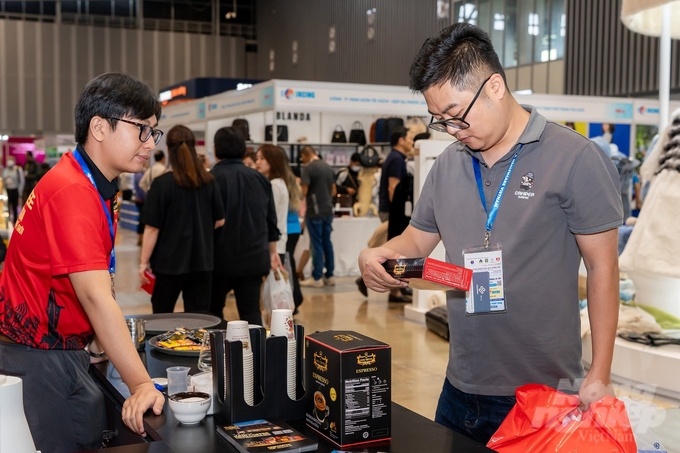
Coffee is one of Vietnam's strong agricultural products that is sought after by many world purchasers.
According to information from the Organization Board of the event series "Connecting the international supply chain of goods" (Viet Nam International Sourcing 2024), there are now a series of leading distributors and retailers in the Latin American region who have registered to participate in Viet Nam International Sourcing 2024 on June 6–8 in Ho Chi Minh City with high expectations of purchasing large quantities of goods and agricultural products from Vietnam.
According to world purchasers, Vietnam has rich raw material sources for agricultural products and is capable of supplying goods to the world. However, Vietnamese businesses need to improve service capacity, understand the market, and understand the needs of world consumers to improve packaging and brands, invest in processing technology, logictis, etc., thereby bringing higher value to Vietnamese agricultural products and conquering the "stomach" of the world.
In the first quarter of 2024, some of Dong Nai's key agricultural products for export had high growth rates. For example, cashew kernels increased by 45.7%, coffee by 95.6%, and wooden products by more than 10% in main markets such as the USA, Japan, China, South Korea, and Europe.
To improve the capacity of businesses, the quality of agricultural products, and expand export markets, departments, branches, and businesses in Dong Nai are currently synchronously implementing many solutions, of which trade promotion is one of the activities receiving attention from this province. In addition to traditional markets, Dong Nai focuses on exploiting and developing new export markets based on the advantages when Vietnam participates in new generation free trade agreements such as CPTPP and EVFTA.
Translated by Thu Huyen
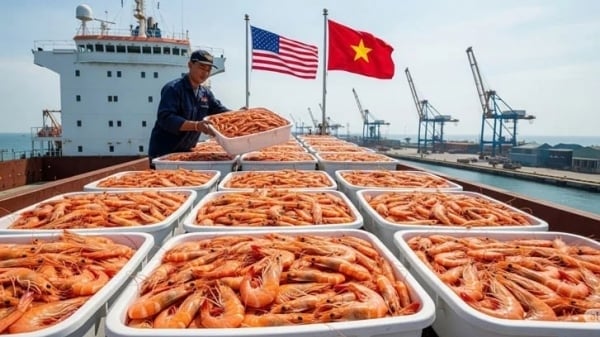
(VAN) Vietnam and the United States are proactively working together, each in their own way, to ensure that every container of agricultural goods carries not just products, but also long-term trust and value.
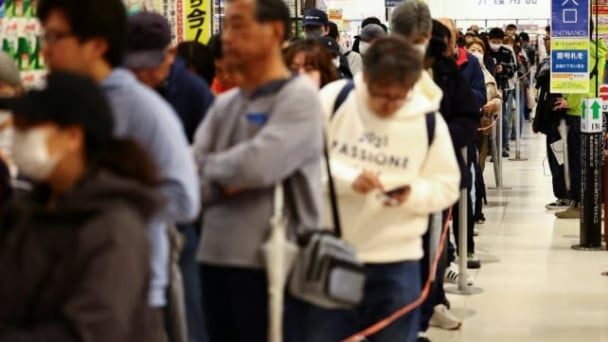
(VAN) Stores have started selling rice from the government’s stockpile to feed demand for the staple.
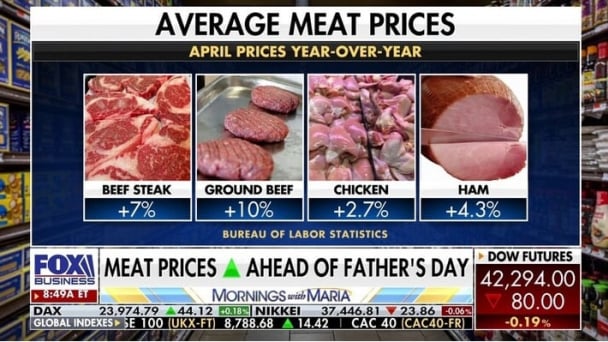
(VAN) Omaha Steaks CEO says rebuilding cattle herds will take about a year to ease price pressures.

(VAN) Reciprocal tariffs and recent NOAA rulings are presenting substantial obstacles for Vietnamese tuna exporters in the U.S. market. As a result, the industry is actively seeking alternative export destinations.
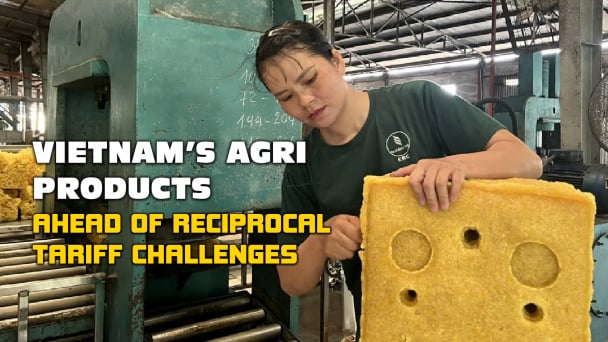
(VAN) Although the U.S. holds a small share of Vietnam’s rubber exports, newly imposed reciprocal tariffs are expected to impact the sector. Vietnamese enterprises must optimize the use of significant markets and free trade agreements.
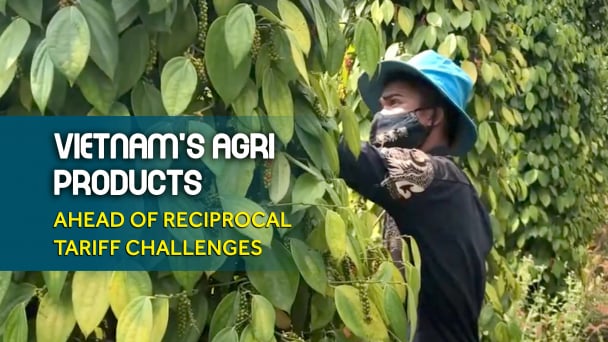
(VAN) Vietnam's pepper industry is looking forward to the final tariff decision in order to sustain its robust presence in the United States, the country's biggest pepper market.

(VAN) The U.S. is the largest market for Vietnamese cashew nuts. However, when exports to the U.S. encounter difficulties due to reciprocal tariffs, Vietnamese cashews still have many other potential markets.